




ORGANS OF PARIS © 2024 Vincent Hildebrandt HOME ALL ORGANS

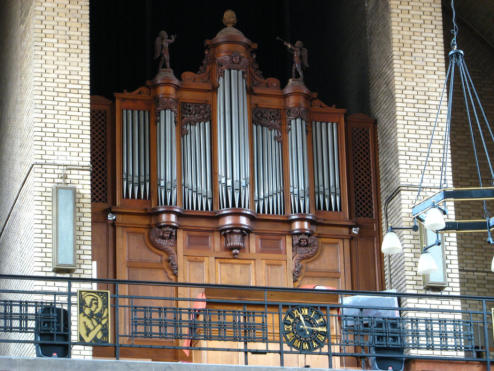
E6
This organ is the former choir organ of Merklin of the Sainte
Clotilde Basilica.
Built by Merklin in 1888 to serve as the choir organ of the
Basilica of Ste Clotilde in Paris, with électro-pneumatical
traction, 14 stops on two expressive keyboards and a pedal.
it was dismantled in 1935, then installed and enlarged by the
Maison Cavaillé-Coll for the Parisian salon of the Marquis de
Froissart, major shareholder and financier of the Maison
Cavaillé-Coll. Some major transformations were made: The
Swell became Expressive Positive and a great Symphonic
Swell was added. A large console of three keyboards
supplanted Merklin's. To achieve this enlargement, the organ
of Azans was used. This organ had been bought in 1923 by
the Marquis de Froissard thanks to Mutin's catalogue (organ
with 2 keyboards, incorporating parts of an organ buffet of
the seventeenth century) for the church of Azans.
In 1948, this organ was ceded to the parish of Saint Léon. It
was then reassembled by Jules Isambart. The Great lost its
expression. On the same keyboard, a new Salicional replaced
the Clarinet, which moved to the Positive, replacing the Voix
Humaine which was not reintegrated. , Dargassies has
restored this instrument. The work consisted of replacing the
transmission, installing new electropneumatic machines for
pulling notes, replacing the draw motors of the stops. The
composition was preserved, but the pressure of the Swell was
reinforced, the funds made more ascending.
The p;iping is various: On the GO and Positif, material of
Merklin. The Salicional 8' of the GO is from Cavaillé-Coll-Pleyel
(1935). On the Récit expressif, pipes from Cavaillé-Coll-Pleyel
(1935).
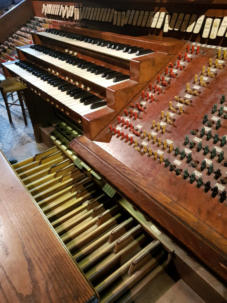
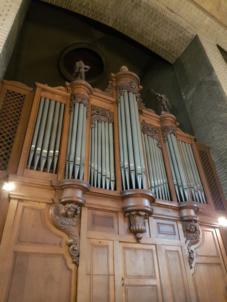
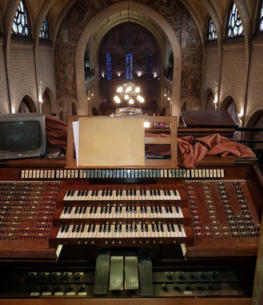
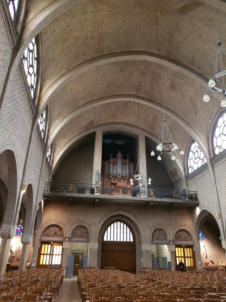
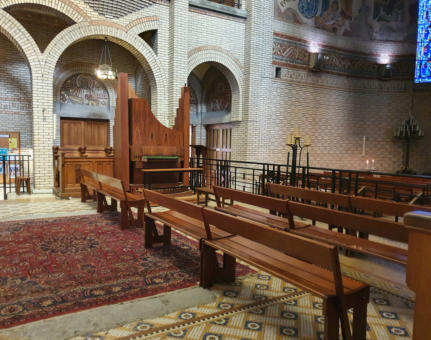
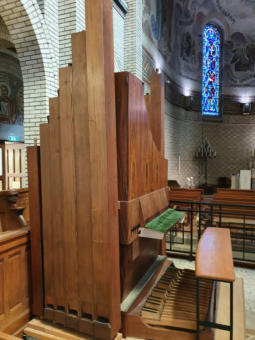
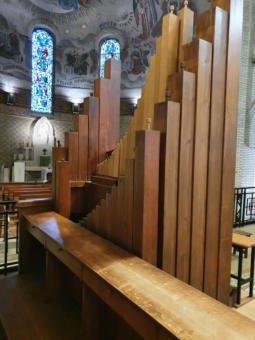
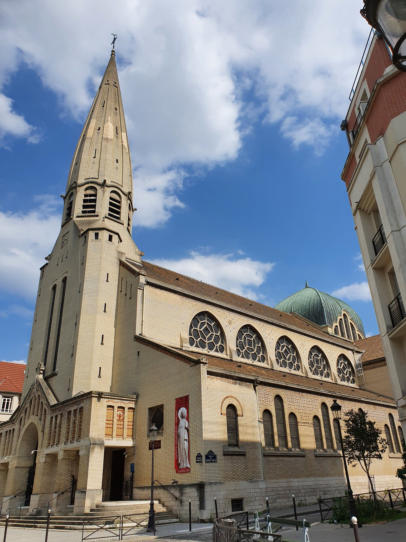
The construction of the church was spread over
several years and it was inaugurated in 1947. The
church was designed by Émile Brunet. It is built of
concrete covered with brick. The art deco-inspired
decoration (stained glass windows, mosaics,
sculptures, ironwork) is characteristic of the 1930s
and 1940s. The mosaic is the work of Auguste
Labouret. The high altar and pulpit were lost. The
stained glass windows of the apse of 1930 (on the
theme of the mysteries of the Rosary) and the
aisle (which represent the sacraments and
instruments of the Passion) are the work of Louis
Barillet. The reliefs were created by Henri
Bouchard and Auguste Cornu, and the ironwork is
the work of Raymond Subes.
Organiste titulaire
Slava Chevliakov
Concerts
-
Masses with organ
Saturday 6:30 PM;
Sunday 9:00, 10:00 and 11:00 AM and 7:00 PM
Vidéos
-
Photo GO: Pierre Marteau
Photos GO below: Victor Weller
1888 - Merklin (1)
1935 - Cavaillé-Coll-Pleyel (3a)
1948 - Isambart (6)
1998/2012 - Dargassies (5)
III/32 (25) - traction électrique
composition
The organs of Paris
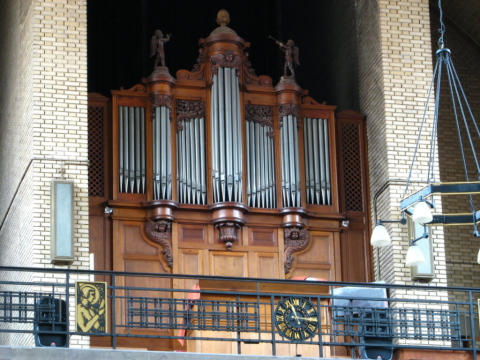
ORGANS OF PARIS © 2024 Vincent Hildebrandt ALL ORGANS
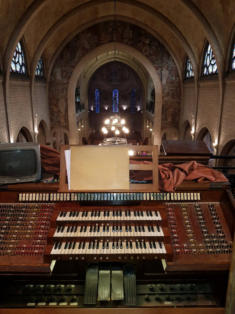
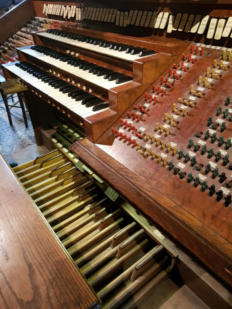
E6
This organ is the former choir organ of Merklin of the Sainte
Clotilde Basilica.
Built by Merklin in 1888 to serve as the choir organ of the
Basilica of Ste Clotilde in Paris, with électro-pneumatical
traction, 14 stops on two expressive keyboards and a pedal.
it was dismantled in 1935, then installed and enlarged by the
Maison Cavaillé-Coll for the Parisian salon of the Marquis de
Froissart, major shareholder and financier of the Maison
Cavaillé-Coll. Some major transformations were made: The
Swell became Expressive Positive and a great Symphonic
Swell was added. A large console of three keyboards
supplanted Merklin's. To achieve this enlargement, the organ
of Azans was used. This organ had been bought in 1923 by
the Marquis de Froissard thanks to Mutin's catalogue (organ
with 2 keyboards, incorporating parts of an organ buffet of
the seventeenth century) for the church of Azans.
In 1948, this organ was ceded to the parish of Saint Léon. It
was then reassembled by Jules Isambart. The Great lost its
expression. On the same keyboard, a new Salicional replaced
the Clarinet, which moved to the Positive, replacing the Voix
Humaine which was not reintegrated. , Dargassies has
restored this instrument. The work consisted of replacing the
transmission, installing new electropneumatic machines for
pulling notes, replacing the draw motors of the stops. The
composition was preserved, but the pressure of the Swell was
reinforced, the funds made more ascending.
The p;iping is various: On the GO and Positif, material of
Merklin. The Salicional 8' of the GO is from Cavaillé-Coll-Pleyel
(1935). On the Récit expressif, pipes from Cavaillé-Coll-Pleyel
(1935).
1888 - Merklin (1)
1935 - Cavaillé-Coll-Pleyel (3a)
1948 - Isambart (6)
1998/2012 - Dargassies (5)
III/32 (25) - traction électrique
composition
Organiste titulaire
Slava Chevliakov
Concerts
-
Masses with organ
Saturday 6:30 PM;
Sunday 9:00, 10:00 and 11:00 AM and 7:00 PM
Vidéos
-
Photo GO: Pierre Marteau
Photos GO below: Victor Weller






















